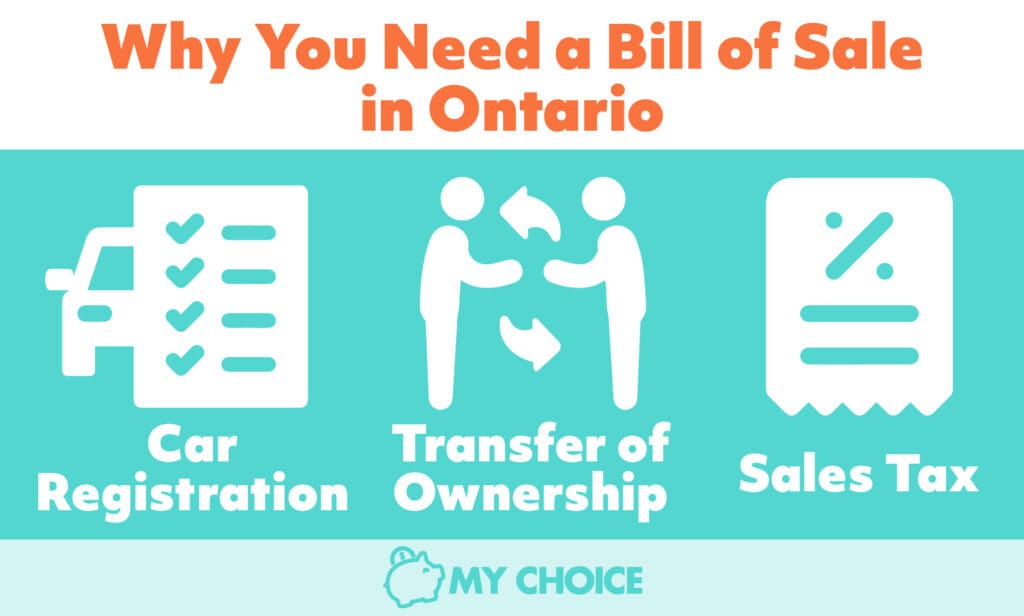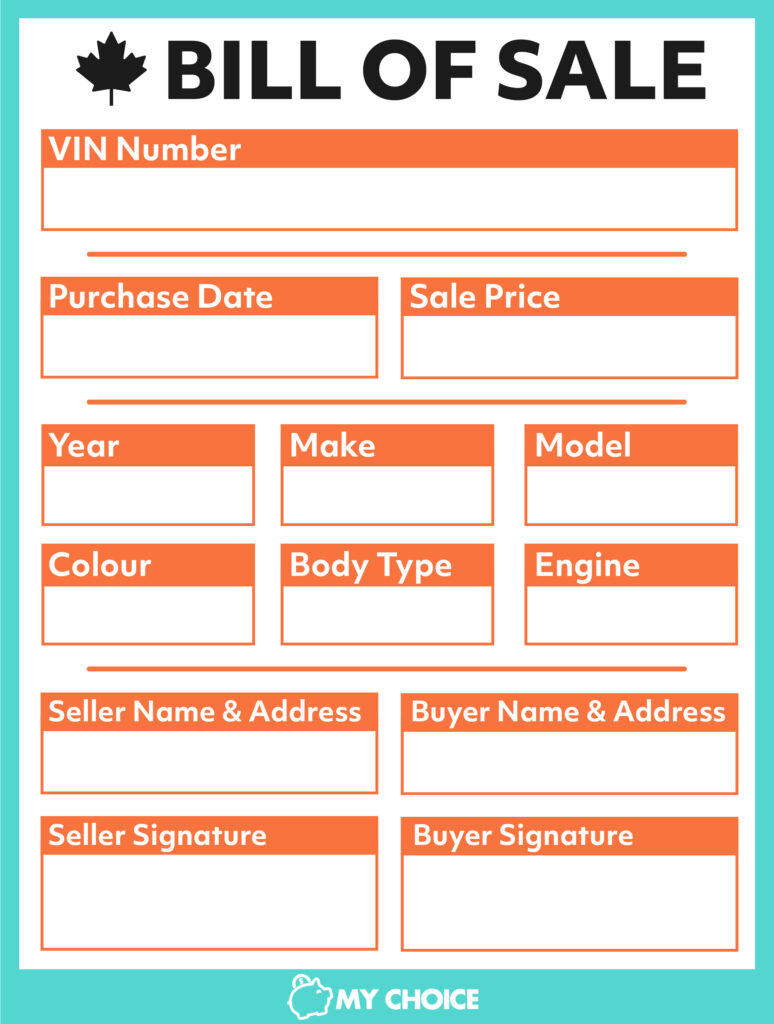
A car bill of sale is a legally required document you need to have ready whether you’re buying or selling a car in Ontario. This form is essential to proving that you have legally bought or sold an automobile. However, a lot of confusion can stem from the fact that there’s no standard format for a car bill of sale in Ontario.
The process of creating a bill of sale is surprisingly simple. Here’s everything you need to know about why and when you need a bill of sale.
Why Do You Need a Bill of Sale in Ontario?
You need a car bill of sale in Ontario to prove that you legally own a car. Without a bill of sale, you’ll run into a lot of trouble when registering your car or applying for the legally mandated auto insurance you need to be able to drive.
Here are a few reasons why you need a bill of sale:
Transfer of Ownership
A bill of sale acts as legal proof of a car’s ownership. To transfer ownership of a car, you need to have a completed bill of sale with the signatures of both the buyer and the seller. Without this document, a buyer can’t legally claim the right to a car’s ownership.
Vehicle Registration
If you buy a used vehicle in Ontario, you’ll need to register it within six days of the purchase being made. A bill of sale is one of the documents you must submit to a ServiceOntario centre to register your vehicle.
Sales Tax
When selling or buying a vehicle in Ontario, you must be aware of sales taxes. A car bill of sale will have a section dedicated to the selling or purchase price of a vehicle, with that price determining how much the buyer has to pay in sales taxes.
Private sales have retail sales tax (RST) and commercial sales have harmonized sales tax (HST), though both have the same rate of 13%. The amount of taxes owed is determined by either the purchase price listed in the bill of sale or the wholesale value of the automobile determined by the Canadian Red Book, whichever is greater.

How to Write a Bill of Sale
To write a bill of sale, you can either fill in a bill of sale template or write it yourself. You can even have a handwritten bill of sale if you’re in a hurry. You can find free templates for a bill of sale at LawDepot or LegalContracts.
If you’re selling a car in Ontario, you’ll find a bill of sale ready to be filled up in the Used Vehicle Information Package that you’re legally required to give to a buyer.
As long as a bill of sale has all the required information filled in, it is legally binding. Here are the fields that a bill of sale needs to have:
Vehicle Identification Number (VIN)
The vehicle identification number (VIN) is the unique identifier for every vehicle manufactured worldwide. No two cars can have the same VIN. You need a VIN on a bill of sale to prove that you are buying or selling the specific car that matches the VIN.
Double-check the VIN listed on the bill of sale and ensure it’s the same number on the vehicle and the owner’s permit. You can usually find a car’s VIN on the interior of the driver’s door or on the driver’s side dashboard when you look in from the windshield. If you can’t find the VIN in either of these locations, you can also find it on the front of the car’s engine block.
Vehicle Description
To clarify that you’re buying a specific car, you need to include the car’s description in the bill of sale. This includes the vehicle’s make, model, year, body type, odometer reading, engine type, and colour. If the description in the bill of sale doesn’t match the car, you may have trouble trying to register it after purchase.
Purchase Date
When buying a used car in Ontario, you must register it at a ServiceOntario centre within six days of the purchase. You can incur penalties with ServiceOntario if the purchase date on your bill of sale indicates that you didn’t register your vehicle in that six-day period.
Purchase/Sale Price
The purchase price on a bill of sale, also known as the sale price, indicates how much you bought or sold a vehicle for. Because the Ministry of Transportation requires a 13% sales tax on buying a new car, the purchase price listed on the bill of sale can determine how much the buyer needs to pay in taxes.
Names, Addresses, and Signatures of The Seller and Buyer
To make a bill of sale legally binding, you need both parties’ names, addresses, and signatures. This signifies the legal agreement between the buyer and the seller. Ideally, this should be signed with both parties present, but they can fill it in separately.

Selling a Used Vehicle
When selling a used car in Ontario, you need to have more requirements ready than just the bill of sale. Some requirements are only needed in Ontario, so it’s best to be ready with them before selling your vehicle.
Used Vehicle Information Package (UVIP)
If you plan to sell a used vehicle in Ontario, you must buy a Used Vehicle Information Package (UVIP) and present it to the buyer before the vehicle can be sold. A UVIP is like a summary of a vehicle’s important information and includes pertinent information to your buyer, like:
- Ontario car registration history
- Make, model, year, and colour
- Tax payment information
- Outstanding debt or lien information
- Average wholesale value
- Bill of sale section
Without a UVIP, you cannot legally sell a used car in Ontario. If you try to sell a vehicle without a UVIP, you risk committing an offence under the Highway Traffic Act. Without a UVIP, the buyer will run into trouble registering the vehicle.
Safety Standards Certificate (SSC)
Your car must prove that it passes the minimum safety standards in Ontario by obtaining a safety standards certificate (SSC). All vehicles must have an SSC before they can be legally roadworthy.
While you can buy and sell used cars that lack safety standards certificates, you cannot put a license plate on a vehicle that does not have one. As a seller, you don’t need to get an SSC for your used vehicle, but it will put a buyer’s mind at ease if you do, which can lead to a faster, easier sale.
Fortunately, you can get an SSC from any licensed garage in Ontario. Once you find a garage with signage that reads “Motor Vehicle Inspection Station,” you can take your vehicle in for an inspection. Once it passes the safety inspection, you will be provided with an SSC that is valid for 36 days.
Application for Transfer
When you sell a used car in Ontario, you’ll need to fill out an Application for Transfer. You can easily find this application on the back of your ownership permit. Once you’ve completed and signed the Application for Transfer section, you then give it to the buyer, who will need it to complete their vehicle registration.
Buying a Used Vehicle
Some of the best cars to buy in Canada are best bought used. However, as a used vehicle buyer, you must know what documents a seller must present to you in a private sale. If a seller forgets to give you a certain document or form, you may encounter difficulties registering your vehicle.
Before you buy a used car, make sure to carefully review the car’s UVIP. Ensure that the seller’s ID matches the vehicle’s ownership record’s name and that the VIN on the UVIP matches the VIN on the car itself. Ask for the bill of sale and ensure all of its information is complete. Then, ask for the owner’s permit and make sure the seller has completed the Application for Transfer section at the back.
To register your newly-bought used vehicle, you’ll need the original bill of sale, completed UVIP, your Ontario Driver’s license, safety standards certificate, the current odometer reading, and the owner’s permit with a completed Application for Transfer section. Visit a ServiceOntario centre with all of these requirements within six days of buying a used vehicle.
Key Takeaways
Whether you’re buying or selling a used car, you will need a bill of sale to legally transfer ownership. Without a bill of sale, a used car buyer won’t be able to register the vehicle in their name, which can lead to a huge legal headache for everyone involved.
Writing a bill of sale is a simple process. You can either look for a free template, write one yourself, or use the bill of sale section in a UVIP. As long as you include all the necessary information we outlined in the article above, your Ontario bill of sale will be legally binding.








